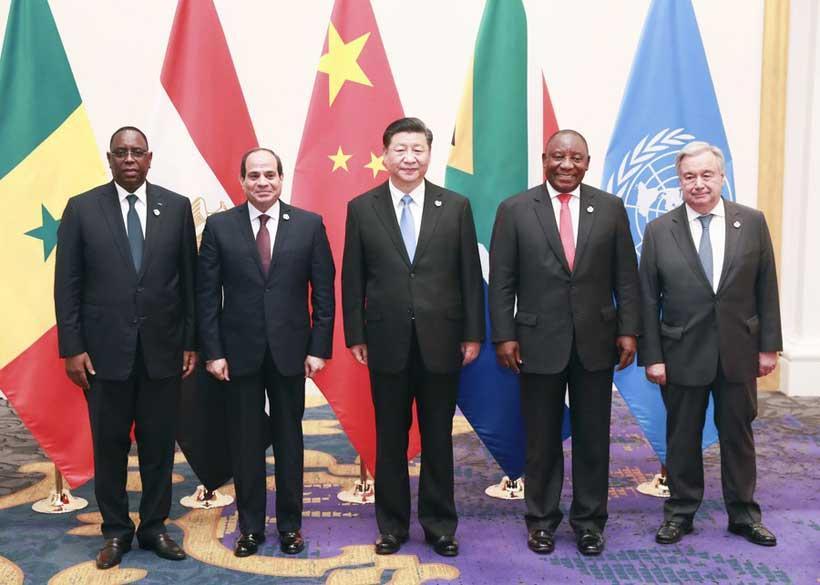BY
MANAHIL JAFFER
Africa-Press – Lesotho. China’s presence in Africa has undergone a dramatic metamorphosis in recent decades. From a limited Cold War-era relationship, China has become Africa’s economic colossus, its largest trading partner, a significant source of investment, and a key player shaping the continent’s future. This growing influence presents a complex picture for African nations, rife with both potential and pitfalls.
The Economic Engine
Africa has become an economic engine powering China’s continued growth. Fueled by an insatiable demand for raw materials and a burgeoning consumer market hungry for manufactured goods, China’s trade with Africa has skyrocketed to a record $282 billion in 2023, with China accounting for over 18% of Africa’s total trade. This dramatic increase reflects Africa’s strategic importance for China’s economic ambitions.
China’s industrial engine thrives on a constant supply of raw materials. Africa boasts a staggering 30% of the world’s mineral reserves, including iron ore crucial for China’s steel production. Lithium, a vital component for electric vehicles and electronics powering China’s technological revolution, is found in abundance in African countries like the Democratic Republic of Congo. Africa supplies a significant portion of China’s oil needs, with Angola being China’s largest supplier of crude oil on the continent.
In addition to its resource wealth, Africa is transforming into a consumer powerhouse, with a growing appetite for China’s manufactured goods. With a young population projected to reach 2.5 billion by 2050, a rapidly urbanizing middle class, Africa’s demand for electronics, infrastructure materials, and consumer products is projected to surge in the coming decades. A McKinsey report estimates that African household consumption could reach $2.1 trillion by 2025.
Infrastructure Boom
Chinese investments have undeniably fueled an infrastructure boom across Africa, addressing a critical development bottleneck that has long stifled progress. Africa suffers from a significant infrastructure deficit, lacking adequate transportation networks, reliable energy grids, and proper communication systems. China has stepped in to fill this gap, launching a wave of ambitious infrastructure ventures.
The Mombasa-Nairobi Standard Gauge Railway in Kenya, a vital trade corridor, and Ethiopia’s Addis Ababa-Djibouti Railway, linking the landlocked nation to a major port, serve as prime examples. Power plants, including hydroelectric dams like the Merowe Dam co-financed by China in Sudan, and solar energy facilities, have been constructed to improve access to electricity, a crucial driver of economic activity. Investments in telecommunication infrastructure have also been made, including fiber optic networks and mobile towers, have improved connectivity across Africa, facilitating communication, access to information, and participation in the digital economy. A 2021 report by McKinsey Global Institute estimates that China has contributed to the creation of 1.4 million jobs in Africa, many linked to these infrastructure projects (McKinsey Global Institute, 2021). Access to electricity improves living standards, powers businesses, and fosters economic growth.
China’s Strategic Embrace
China’s engagement in Africa extends far beyond simply securing resources. The Belt and Road Initiative (BRI) positions Africa as a crucial player, with 46 African countries having signed BRI agreements by 2023. These agreements encompass various projects, from ports and railways to telecommunication networks, and offer the potential for significant infrastructure development and economic growth. China’s approach to Africa stands in stark contrast to traditional Western involvement. Unlike Western nations that may emphasize democratic reforms and good governance as preconditions for aid, China prioritizes rapid economic development with less political scrutiny.
China’s engagement goes beyond pure economic pursuits. It actively fosters cultural exchange through initiatives like the Confucius Institutes and scholarship programs for African students. China presents a distinct narrative for African development, one that emphasizes collaboration and mutual benefit. This narrative rests on principles of mutual respect, non-interference in internal affairs, and a focus on South-South cooperation. China’s approach can be seen as a strategy for achieving a “soft rise” on the world stage. It departs from the traditional Western model, often perceived as exploitative, where one party benefits at the expense of the other. China, on the other hand, emphasizes a “win-win” strategy where both China and Africa can achieve collective gains through cooperation and shared prosperity.
Future Outlook
The relationship between China and Africa is complex and constantly evolving. While China’s economic clout presents both opportunities and challenges, Africa is not simply a pawn in a larger geopolitical game. The continent holds immense potential to chart its own course towards a more prosperous and secure future. By fostering transparency, prioritizing sustainability, and leveraging partnerships with various actors, Africa can navigate the “dragon’s embrace” and emerge as a major player on the global stage. The choices made today will determine whether China’s influence empowers or entraps Africa. By seizing the opportunities presented by a globalized world and addressing the challenges head-on, Africa can write its own development story, ensuring a future where the elephant stands tall and strong, a symbol of Africa’s resilience and capacity for self-determination.
moderndiplomacy
For More News And Analysis About Lesotho Follow Africa-Press






